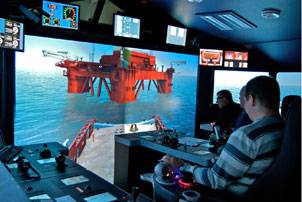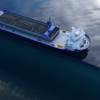Kongsberg Forms Research Group to Optimize Simulator
Kongsberg Maritime AS, Simulation & Training has made an agreement with the Research Council of Norway to form a user-directed research program called SIMAR - Simulation of Demanding Maritime Operations - which is aimed at improving simulation training by enhancing focus on human factors.
The main goal of the research project is to obtain new and improved knowledge of human factors in a learning environment based on simulated complex maritime operations, in order to develop a new generation of research based, maritime simulators for demanding and risky operations, e.g. anchor handling in offshore environments. The aim is to be able to assess and measure the effect of the simulator training; both in the simulator (based on the specific learning objectives) and during the actual maritime operations (such as reduced risk, reduced number of accidents, less oil spills, reduced costs related to loss of equipment and more efficient operations).
To achieve this, the project has defined 4 sub goals:
1. Defining and developing human learning objectives based on relevant parameters available in the simulator
2. Designing and controlling the exercise/scenario
3. Increasing the knowledge of how simulator training affects human learning
4. Strategies for implementing knowledge of human factors
Research has proven that simulator training is an important tool to build competence and reduce accidents. SIMAR could improve simulator training further by introducing competence in the education process through extensive testing on new and efficient education methods. Today, the success or failure of simulator training depends on the quality of the psychological teaching principals used and the psychological factors in the simulator software (training program).
Through the SIMAR project, Kongsberg Maritime hopes to develop a simulator that combines state-of-the-art simulator technology with state-of-the-art human factors knowledge. "We have used our market and operational competence in combination with our simulator hardware and software expertise to provide high quality training for seafarers since the seventies," said Terje Heierstad, Product & Technology Manager, Kongsberg Maritime, Simulation & Training.
"Technology has developed fast and we are now offering incredible degrees of realism so we are keen to develop the learning aspects and human factors in simulation training further. There is currently very little research in this field, so SIMAR is exploring new ground for the maritime industry. We are convinced that the cooperation with the Research Council of Norway and our R&D partners will contribute to the development of the best tool for the future training on demanding operations."
The task of defining and developing human learning objectives based on relevant parameters available in a simulator will primarily be carried out by Chalmers University of Technology: "At the institution for Shipping and Marine Technology and in the competence centre, Lighthouse, we have developed competence for research and development within many maritime fields. SIMAR gives us a unique possibility to practice our knowledge - both employees and students - to improve maritime education and safety at sea," said Margareta Lützhöft, Docent at Chalmers University of Technology, Institution for Shipping and Marine Technology, department for vessel work environment and safety, Gothenburg.
The University in Vestfold will in cooperation with the University in Oslo, be responsible for performing research on the education process in the simulator based on knowledge of mechanism and methods in education. Testing of new training exercises, based on competence of educational mechanism, will be executed at the simulator centre at Vestfold University College.
Marius Imset, Institute Leader at the Faculty of Technology and Maritime Science at the University College in Vestfold explains: "Knowledge on how new information technology and instrumentation can contribute to increased safety and efficiency within the maritime sector is a priority area for us at Vestfold University College. We perform research on how human factors work together with technology and organization, and the use of advanced simulators provides new and exciting possibilities. Our cooperation with KONGSBERG, the University of Oslo and Chalmers is unique, as it brings together different world-leading communities on complex and demanding maritime operations. We are proud to contribute to the SIMAR project, which will bring out new knowledge with the purpose to increase safety, efficiency and improve the use of energy."













